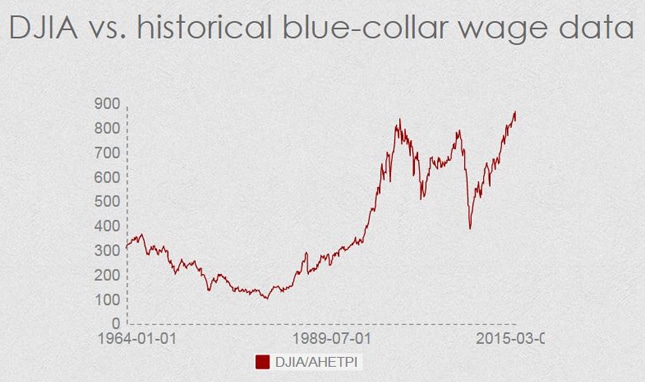U.S. stock markets are at, or near, all-time highs. In March, 2015, the Dow Jones Industrial Average (DJIA) peaked at 18,288. One month later, on April 24, the Standard & Poor’s 500 (S&P) broke its all-time record when it closed at 2,117. Just last week, the Nasdaq stock index hit a record of 5,092.
What has some stock investors concerned, however, is not the “what goes up must come down” rule. Rather, it’s the average hourly earnings ratio, as well as the historical effects of rising interest rates on stock markets, that worry stock market analysts.
U.S. Wages & Stock Markets
Although the U.S. Labor Department says that stock markets are near all-time highs, sluggish wage growth has made it tougher for household investors to capitalize on stock price increases. Inflation of the dollar means that workers’ earnings are worth even less, so a great deal of the “prosperity” coming from stocks has gone to corporations, not “mom-and-pop” investors.
The following chart shows the ratio of the DJIA to U.S. workers’ wages; today’s rate is nearly three times the historical average.
Rising Interest Rates vs. Stock Markets
Is it a coincidence that U.S. stock markets are near all-time highs at the same time that interest rates are near all-time lows? Historical data says it’s anything but.
The most recent rising interest rate cycle in the United States began in the early 1960s, and it lasted for about 20 years. During that time, stocks saw an inflation-adjusted decline of approximately 3% for each 1% increase of the Fed’s prime lending rate.
The head of the Federal Reserve, Janet Yellen, has indicated that interest rates could begin to rise within the next two months. Economists, meanwhile, have estimated that the prime lending rate could triple by 2016.
Based on what happened from 1960 to 1980, what do you think these recent developments could mean for stock prices?
The Bottom Line
Investors who hold stocks and/or mutual funds within their 401k accounts cannot ignore the wage to stock price ratio, nor can they pretend that the effect rising interest rates had on stocks from 1960 through 1980 was an anomaly.
Do you own stocks? To protect your assets from problems in the U.S. economy, then visit www.401kRollover.com today to find out how to flex your financial muscle with a 401k rollover.









